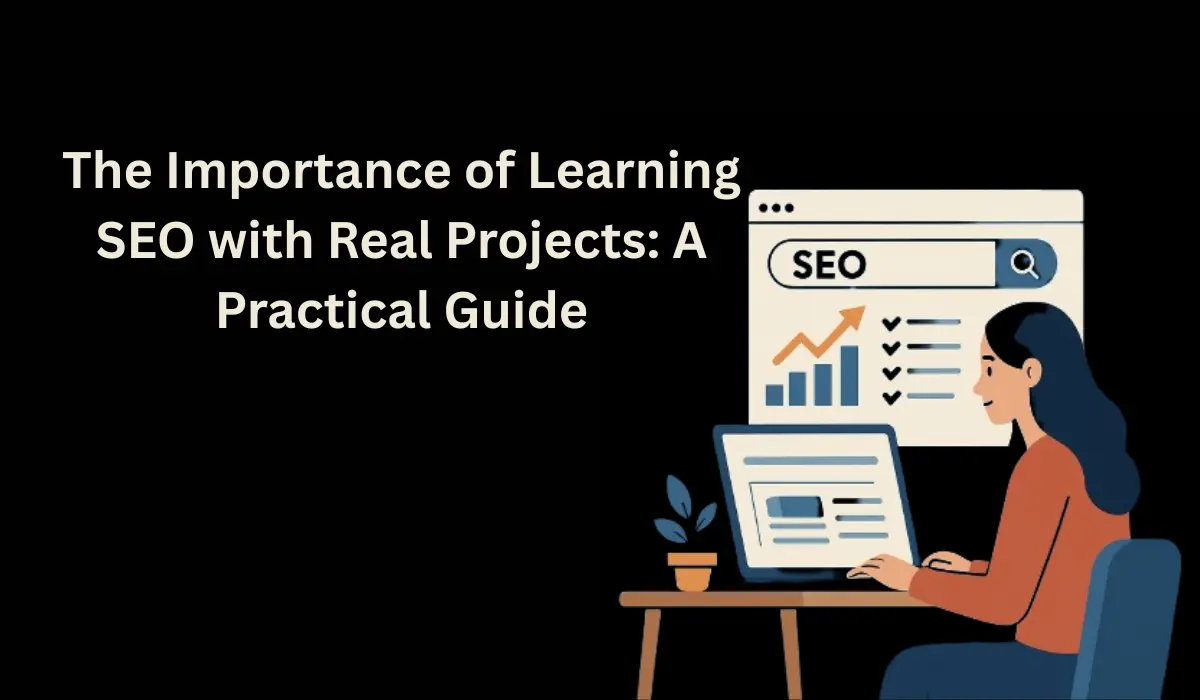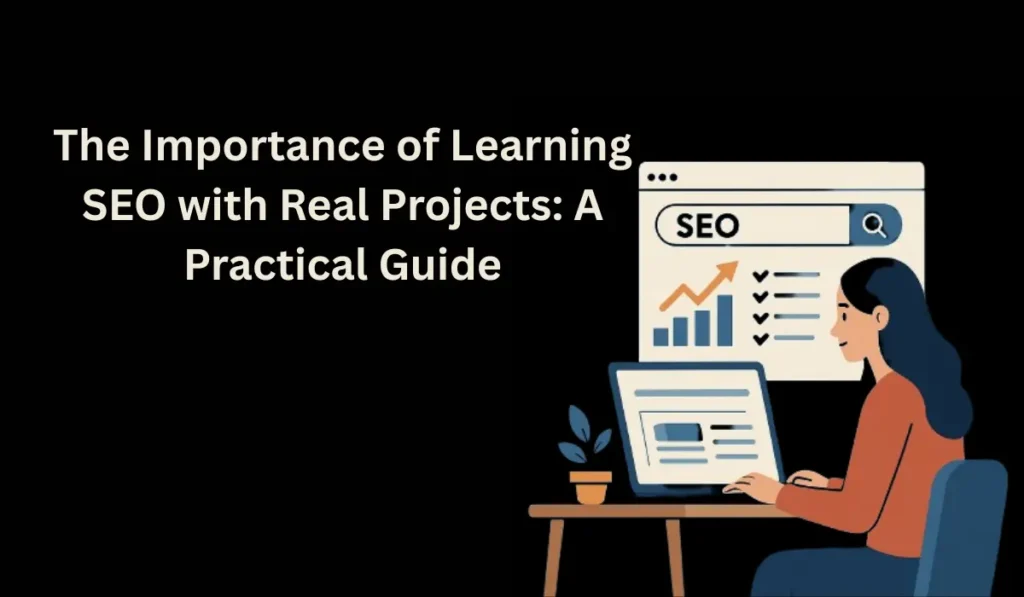Search Engine Optimization (SEO) is a crucial skill in digital marketing, helping businesses and individuals improve their online visibility. While theoretical knowledge is essential, learning SEO through real projects is the most effective way to master it.
In this article, we’ll explore why hands-on SEO experience is invaluable, how real projects enhance learning, and practical ways to apply SEO techniques in real-world scenarios.
Why Learning SEO with Real Projects Matters
1. Theory vs. Practice: Bridging the Gap
Many SEO courses teach concepts like keyword research, on-page SEO, and backlinking—but without applying them, learners struggle to understand real challenges.
- Example: You may learn that “title tags should be under 60 characters,” but you will only see how search engines actually display them by testing different lengths on a live website.
2. Understanding Algorithm Updates & Real-Time Changes
Search engines like Google frequently update their algorithms. Working on real projects helps you:
- Adapt to changes (e.g., Core Updates, BERT, or Helpful Content updates).
- See firsthand how updates impact rankings and traffic.
3. Developing Problem-Solving Skills
Real projects present unexpected issues like:
- Sudden ranking drops
- Indexing problems
- Penalty recovery
- Technical SEO errors (e.g., crawlability issues)
Hands-on experience trains you to troubleshoot effectively.
4. Building a Portfolio for Career Growth
Employers and clients prefer SEO professionals with proven experience. Real projects allow you to:
- Showcase rankings improvements.
- Present case studies (e.g., “Increased organic traffic by 200% in 6 months”).
- Demonstrate expertise beyond certifications.
How to Learn SEO with Real Projects
1. Start Your Own Website or Blog
- Choose a niche (e.g., travel, tech, fitness).
- Apply on-page SEO (keyword optimization, meta tags, internal linking).
- Track rankings using tools like Google Search Console, Ahrefs, or SEMrush.
Example Project:
- Create a blog on “Sustainable Living.”
- Optimize 10 articles for low-competition keywords.
- Monitor traffic growth over 3 months.
2. Offer Free SEO Audits for Small Businesses
- Analyze local businesses’ websites for SEO issues.
- Provide actionable recommendations (e.g., fixing broken links, improving page speed).
- Document improvements as case studies.
3. Run a Local SEO Experiment
- Optimize a Google My Business (GMB) profile.
- Track changes in local rankings and clicks.
- Test different strategies (e.g., reviews, citations, localized content).
4. Participate in SEO Challenges
- Join platforms like Ahrefs’ SEO Challenges or Moz’s YouMoz.
- Work on real-world tasks (e.g., recovering a penalized site).
5. Freelance or Intern in SEO
- Take small gigs on Upwork or Fiverr.
- Work under an experienced SEO specialist.
Key Lessons from Real SEO Projects
SEO Takes Time – Ranking improvements may take weeks or months
One of the most important lessons in SEO is that results don’t happen overnight. Unlike paid advertising (like Google Ads or social media ads), SEO is a long-term strategy where ranking improvements can take weeks, months, or even years, depending on competition, website authority, and industry.
Here’s why SEO is a slow process and what factors influence the timeline:
Why Does SEO Take So Long?
1. Search Engines Need Time to Crawl and Index Changes
- Before ranking, Google’s bots must discover, crawl, and index your content.
- New websites or pages may take days to weeks to appear in search results.
- Major updates (like site migrations) can take months to fully reflect in rankings.
2. Google’s Algorithm Updates Gradually Affect Rankings
- Google runs thousands of tests before rolling out major updates (e.g., Core Updates, Helpful Content Update).
- Even after optimizing, you may not see immediate ranking shifts until the next update.
3. Building Authority Takes Time
- New websites have little to no domain authority, making it harder to rank quickly.
- Backlinks, a key ranking factor, require outreach and time to earn naturally.
- Trust signals (like user engagement and brand mentions) accumulate slowly.
4. Competition Plays a Big Role
- Low-competition keywords may rank in weeks.
- High-competition keywords (e.g., “best smartphones”) can take 6–12+ months to rank for, even with strong SEO.
How to Speed Up SEO Results (Within Reason)
While SEO is inherently slow, you can optimize your efforts for faster (but still gradual) improvements:
1. Publish High-Quality, Optimized Content Frequently
- Google favors fresh, relevant content.
- Consistent publishing helps with indexing and authority.
2. Improve Technical SEO for Faster Crawling
- Fix broken links, improve site speed, and use a clear sitemap.
- Submit pages to Google Search Console for faster indexing.
3. Build High-Quality Backlinks Strategically
- Guest posting, HARO (Help a Reporter Out), and digital PR can speed up authority growth.
4. Optimize for User Experience (UX)
- Lower bounce rates and higher dwell time signal quality to Google.
5. Target Long-Tail Keywords First
- Easier to rank for, bringing in traffic while you work on competitive terms.
Patience is Key – SEO is a Marathon, Not a Sprint
Many beginners give up on SEO too soon because they expect quick wins. However, the best SEO results come from consistent effort over time.
Example Case Study:
- Website A publishes 10 well-optimized articles but sees no traffic in the first month.
- After 3 months, a few articles start ranking on page 2.
- By 6–12 months, some reach page 1, bringing steady organic traffic.
Data-Driven Decisions Matter – Rely on analytics, not guesses
SEO is not about hunches or assumptions—it’s a science that thrives on data. Making decisions based on real analytics instead of guesses separates successful SEO professionals from those who struggle with inconsistent results.
Here’s why data-driven SEO is crucial and how to implement it effectively.
Why Data-Driven SEO Decisions Matter
1. Avoid Wasted Time & Resources
- Guessing which keywords to target or which pages to optimize leads to wasted effort.
- Data (like search volume, competition, and CTR) helps prioritize high-impact tasks.
2. Understand User Behavior
- Analytics reveal:
- Which pages get the most traffic.
- Where visitors drop off (high bounce rates).
- What content drives conversions.
3. Measure What Actually Works
- Without tracking, you won’t know if:
- Your backlinks are improving rankings.
- Your content updates are increasing traffic.
- Technical fixes (like improving page speed) help rankings.
4. Adapt to Algorithm Changes
- Google’s updates can shift rankings unpredictably.
- Data helps identify drops and recover faster.
How to Make Data-Driven SEO Decisions
1. Set Clear KPIs (Key Performance Indicators)
- Track measurable goals like:
- Organic traffic growth (monthly comparisons)
- Keyword rankings (top 3, top 10 positions)
- Conversion rates (leads, sales, sign-ups from SEO)
2. Use A/B Testing for On-Page SEO
- Test different:
- Title tags & meta descriptions (see which gets higher CTR)
- Content layouts (long-form vs. short-form, multimedia vs. text)
- Internal linking strategies (impact on rankings & engagement)
3. Analyze Competitor Gaps
- Identify:
- Keywords they rank for but you don’t (opportunities)
- Backlinks they have that you’re missing (outreach targets)
4. Fix What’s Underperforming
- If a page has:
- High impressions but low CTR? → Improve meta titles/descriptions.
- Traffic but high bounce rate? → Enhance content quality or UX.
- Declining rankings? → Check for lost backlinks or content decay.
5. Predict Trends with Historical Data
- Compare YoY (Year-over-Year) data to:
- Spot seasonal trends.
- Measure long-term SEO growth.
Also Read
Technical SEO is Critical – Site speed, mobile-friendliness, and structured data impact rankings.
Technical SEO forms the foundation of your website’s visibility in search engines. While content and backlinks get much attention, technical factors like site speed, mobile optimization, and structured data directly influence how search engines crawl, index, and rank your pages. Ignoring these can sabotage even the best content strategy.
Why Technical SEO Matters for Rankings
1. Site Speed: A Direct Ranking Factor
Google explicitly states that page speed affects rankings, especially after the “Speed Update” (2018) and Core Web Vitals (2021).
- Impact on Rankings:
- Slow sites get lower rankings (Google prioritizes fast-loading pages).
- Poor speed increases bounce rates (users leave if pages take >3 sec to load).
- Affects mobile rankings (critical since mobile-first indexing is default).
- How to Improve:
- Optimize images (compress with TinyPNG/Squoosh).
- Enable browser caching & use a CDN (Cloudflare, BunnyCDN).
- Minify CSS/JS (tools like WP Rocket, Autoptimize).
- Upgrade hosting (avoid shared servers for high-traffic sites).
2. Mobile-Friendliness: Google’s #1 Priority
Since mobile-first indexing, Google primarily uses the mobile version of your site for ranking.
- Impact on Rankings:
- Non-mobile-friendly sites drop in mobile search results.
- Poor mobile UX (tiny text, unclickable buttons) hurts engagement.
- How to Improve:
- Use responsive design (no separate mobile URLs).
- Test with Google’s Mobile-Friendly Test.
- Ensure tap targets (buttons) are spaced properly (avoid accidental clicks).
- Fix viewport settings (no horizontal scrolling).
3. Structured Data (Schema Markup): Boosts CTR & Rich Snippets
Structured data helps Google understand your content better, leading to:
- Rich snippets (star ratings, FAQs, breadcrumbs).
- Higher CTR (eye-catching results stand out).
- Better indexing (helps with voice search & AI overviews).
- How to Implement:
- Use Schema.org markup (JSON-LD format recommended).
- Test with Google’s Rich Results Test.
- Add for:
- Articles
- Products
- Local business info
- FAQs & How-To guides
Other Critical Technical SEO Factors
1. Crawlability & Indexing
- Blocked by robots.txt? → Google won’t index key pages.
- Broken links (404 errors)? → Hurts user experience & rankings.
- Duplicate content? → Can dilute SEO value.
Fix with:
- XML sitemap (submit via Google Search Console).
- Canonical tags for duplicate content.
- Internal linking to help Google discover pages.
2. HTTPS Security
- Google ranks HTTPS sites higher than HTTP.
- Affects user trust (browsers flag “Not Secure” sites).
Fix with:
- Install an SSL certificate (free via Let’s Encrypt).
- Force HTTPS via .htaccess or Cloudflare.
3. Core Web Vitals (2024 Ranking Factor)
Google measures:
- LCP (Largest Contentful Paint) – Loading speed (<2.5s ideal).
- FID (First Input Delay) – Interactivity (<100ms).
- CLS (Cumulative Layout Shift) – Visual stability (<0.1).
Improve with:
- Lazy loading images/videos.
- Remove render-blocking JavaScript.
- Preload critical resources.
Content Quality > Quantity – Google rewards helpful, in-depth content
In the early days of SEO, websites could rank simply by publishing massive amounts of low-quality content stuffed with keywords. Today, Google’s algorithms (like Helpful Content Update, BERT, and RankBrain) prioritize high-quality, user-focused content over sheer volume.
If you want to rank higher, earn backlinks, and engage visitors, you must focus on quality over quantity. Here’s why—and how to create content that Google loves.
Why Google Prioritizes Quality Over Quantity
1. Google’s Helpful Content Update (2022) Penalizes Low-Quality Content
- Websites with thin, AI-spun, or regurgitated content saw traffic drops.
- Google now demotes sites that prioritize “search engines over human readers.”
2. RankBrain & BERT Understand User Intent
- Google’s AI evaluates:
- Does this content truly answer the query?
- Is it more useful than competitors’ content?
- Shallow, generic articles lose to in-depth, expert-level content.
3. High-Quality Content Earns More Backlinks & Shares
- Authoritative sites naturally attract links (a key ranking factor).
- Engaging content gets shared (social signals indirectly help SEO).
4. Dwell Time & Low Bounce Rates Signal Quality
- If users stay longer (high dwell time), Google assumes your content is valuable.
- If they leave immediately (high bounce rate), rankings may drop.
What Does “High-Quality Content” Actually Mean?
Google’s Search Quality Evaluator Guidelines define quality content as:
Expertise, Authoritativeness, Trustworthiness (E-A-T)
- Written by credible authors (show author bios, credentials).
- Cited with trusted sources (studies, expert quotes).
Comprehensive & In-Depth
- Covers all aspects of a topic (not just surface-level info).
- Better than competitors’ content (check top-ranking pages).
User-Focused (Not Just SEO-Optimized)
- Solves a real problem for readers.
- Avoids keyword stuffing (reads naturally).
Fresh & Updated Regularly
- Google prefers recently updated content (especially for YMYL niches like health, finance).
Backlinks Still Matter – High-authority links boost rankings but require outreach
Despite Google’s ever-evolving algorithms, backlinks remain one of the top 3 ranking factors. However, not all links are equal—high-authority, relevant backlinks significantly impact rankings, while spammy or low-quality links can hurt your site.
Here’s why backlinks still matter in 2025, how they influence SEO, and proven strategies to earn them (without risking penalties).
Why Backlinks Still Matter for SEO
1. Google Confirms Links Are a Ranking Factor
- Gary Illyes (Google Analyst): “Links are still in the top 3 ranking signals.”
- Search Quality Guidelines emphasize natural, editorial backlinks as trust signals.
2. High-Authority Links Pass “Link Juice” (PageRank)
- Sites like Forbes, Wikipedia, or .edu/.gov domains pass stronger ranking power.
- More authority = faster rankings for competitive keywords.
3. They Help Google Discover & Index Pages Faster
- Backlinks act as votes of confidence, telling Google:
- “This page is valuable.”
- “It should be crawled and ranked.”
4. They Drive Referral Traffic & Brand Authority
- A link from CNN, TechCrunch, or a niche blog brings targeted visitors.
- Earns trust from users and search engines.
What Makes a “High-Quality” Backlink?
From authoritative sites (high Domain Rating/AHREFS DR).
Relevant to your niche (a fitness site linking to a health blog).
Editorial (not paid/spammy) – Natural mentions in content.
Dofollow (not nofollow) – Passes SEO value (though nofollow links still help for diversity).
Anchored naturally (not over-optimized exact-match keywords).
Bad Backlinks to Avoid:
- PBNs (Private Blog Networks) – Risky, can lead to penalties.
- Link farms, spammy directories – Google devalues these.
- Excessive guest post links with keyword-rich anchors – May trigger algorithmic filters.
How to Build High-Authority Backlinks (White-Hat Strategies)
1. Create Link-Worthy Content
- “Skyscraper Technique” – Find top-ranking content, make yours 10x better.
- Original research & case studies (e.g., “2024 Survey of 1,000 Marketers”).
- Ultimate guides & in-depth tutorials (e.g., “The Complete SEO Guide for Beginners”).
2. Guest Blogging (The Right Way)
- Target relevant industry blogs (use Ahrefs to find sites accepting guest posts).
- Pitch unique, high-value content (not just a link drop).
- Example:
- “Can I publish a generic post with a backlink?”
- “I noticed you cover digital marketing trends—I have original data on X that your audience would love.”
3. Broken Link Building
- Find dead links on authority sites (Checkmate or Ahrefs).
- Email: “Hey, I noticed your link to [broken URL] is down—my guide on X could be a great replacement!”
4. Digital PR & Expert Roundups
- Get featured in industry expert lists (e.g., “Top 50 SEO Experts in 2024”).
- Example pitch: “I’d love to contribute insights on [topic] for your upcoming roundup.”
5. Build Relationships (Not Just Links)
- Engage with bloggers, journalists, influencers.
- Share their content → They may link back naturally.
Conclusion
Learning SEO through real projects is the best way to gain practical expertise. Whether you start a blog, optimize a local business website, or take on freelance work, hands-on experience will help you:
- Understand real-world SEO challenges.
- Adapt to algorithm changes.
- Build a strong portfolio.
Action Step: Pick one project today—launch a blog, audit a website, or optimize a GMB profile—and start applying SEO techniques right away!





